Trump and his Democratic rivals forced to consider whether to cancel rallies over coronavirus
WASHINGTON – Since the beginning of the year President Donald Trump has made a point of holding campaign rallies before every Democratic primary election. But as fears over the spread of coronavirus ripple across the country, a Trump rally on the eve of the primary in the key battleground state of Michigan was notably absent from his schedule.
Instead, he flew to Orlando, Florida for a fundraising event after spending the weekend at his Mar-a-Lago resort. Trump was photographed shaking hands with supporters upon his arrival in Florida, even as health officials have warned to avoid public gatherings and limit personal interactions with others.
COVID-19 has shown no signs of slowing its spread across the U.S. Confirmed cases surpassed 600 across more than 30 states and the District of Columbia on Monday. The U.S. death toll rose to 22, while the worldwide total approached 4,000.
"I'm not concerned at all," the president told reporters Saturday when asked if he was troubled by the cases around Washington. "No, we've done a great job with it."
Cities across the country have scrapped high-profile music festivals while universities are canceling classes to curb regional outbreaks of coronavirus, raising fresh questions about whether Trump and his Democratic challengers – Sen. Bernie Sanders and former Vice President Joe Biden – should be holding campaign rallies that attract thousands of people. All three men are also in their 70s, an age bracket that is particularly vulnerable to the effects of COVID-19.
'Judgment call'
When asked whether the president should continue with campaign rallies during a press briefing Monday, Anthony Fauci, director of the National Institute of Allergy and Infectious Diseases, largely evaded the question and called it a "judgment call."
He told reporters that it "might be a good judgment" to hold a rally in a place where there's no community spread, but added: "If you want to talk about large gatherings in a place where you have a community spread, I think that's a judgment call and if someone decides they will cancel it I wouldn't publicly criticize them."
Coronavirus spreading in the U.S.: Here's everything to know
But former FDA commissioner Dr. Scott Gottlieb told USA TODAY that the campaigns should be focusing on protecting the candidates from the risk of transfer of coronavirus as they crisscross the U.S. amid uncertainty over affected areas.
"They fly around the country, they see different audiences, they're in regions where there could be outbreaks we haven't detected yet," he said.
"I think it would be smart for the campaigns and political leaders to lead by example and start to curtail large gatherings," Gottlieb said, noting that the U.S. has asked municipalities to scale back public events and businesses have proactively told employees to work remotely amid the panic.
"For the campaigns to lead by example and do that would be very important to send a powerful message," he added.
'You can't be a politician and not shake hands'
Trump has indicated he isn't making changes to his routine because of the coronavirus. A self-acknowledged germophobe who is said to frequently slather his hands with sanitzer, Trump recently told Fox News there is no way to politely avoid shaking hands.
"You can't be a politician and not shake hands," he said at a town hall in Scranton, Pennsylvania, on Thursday. "The bottom line is, I shake anybody's hand now. I'm proud of it."
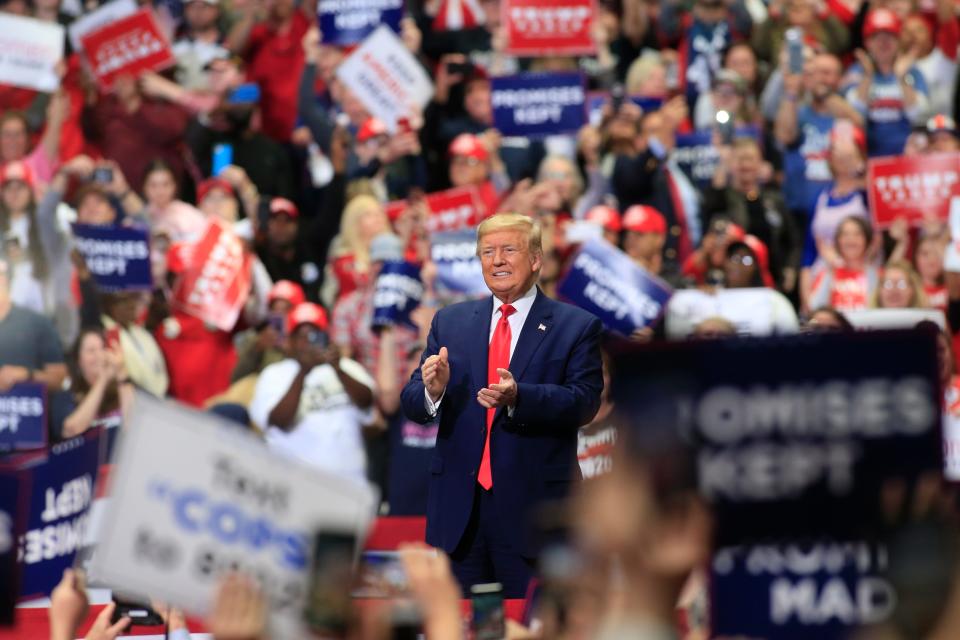
Tim Murtaugh, director of communications for the Trump campaign, dismissed reports that there was any scaling back of the president's events over coronavirus. He said the "main consideration for rallies is President Trump's schedule."
He pointed out Trump attended last week's rally before North Carolina's primary election, the Scranton town hall and fundraising events over the weekend and on Monday.
"The campaign is proceeding normally. We will announce rallies when they are ready to be announced," Murtaugh said.
Coronavirus panic: Donald Trump floats payroll tax cut, other financial relief for businesses
But the rally and the town hall came before the American Conservative Union announced Saturday that one of the attendees at last month's Conservative Political Action Conference in National Harbor, Maryland, had tested positive for the coronavirus. Trump and Vice President Mike Pence both spoke at the event, which was held Feb. 26-29.
The group said the man, a New Jersey resident, was exposed to the virus before the conference, where he "had no interaction with the President or Vice President."
An image emerged over the weekend of Trump shaking hands with Matt Schlapp, the chairman of the American Conservative Union, who acknowledged he was in direct contact with the individual who tested positive over the four-day conference.
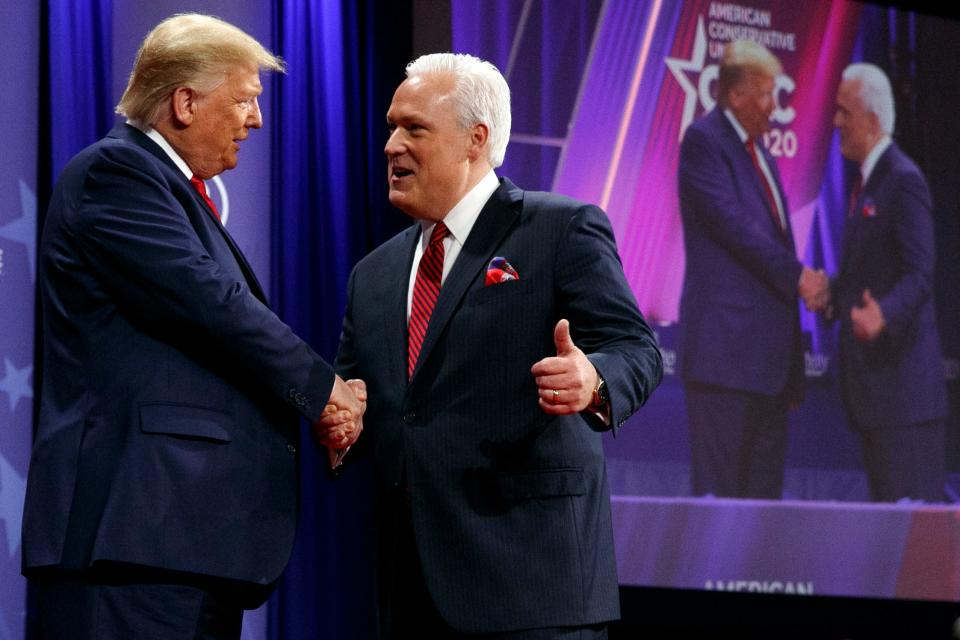
While the timeline of events was unclear, a "Women for Trump" bus tour due to kick off Monday featuring Schlapp's wife, Mercedes Schlapp, was suspended due to "scheduling conflicts" and not because of coronavirus, according to campaign spokesman Ali Pardo.
Administration officials have also downplayed concerns over the virus inching closer to the president. But since Saturday's announcement, several Republican lawmakers who came in contact with the individual at CPAC have said they are self-quarantining as a precaution. Two of those lawmakers – Rep. Matt Gaetz and Rep. Doug Collins – have been in close contact with Trump in recent days.
Business as usual?
While there is no indication the president has had any exposure to coronavirus, the growing list of lawmakers who have and are in close proximity to the president underscores how much the outbreak poses a threat to both Trump's health and his re-election bid.
"I don’t know if Trump is risking his health by campaigning, but he’s certainly taking a big political risk. If the coronavirus continues to spread, Democrats will accuse Trump of prioritizing politics over public health," said Alex Conant, a Republican strategist who worked on Florida Sen. Marco Rubio's campaign.
"Kissing babies and shaking lots of hands doesn't seem like a good idea in the midst of a contagious epidemic. Nobody wants to get their supporters sick."
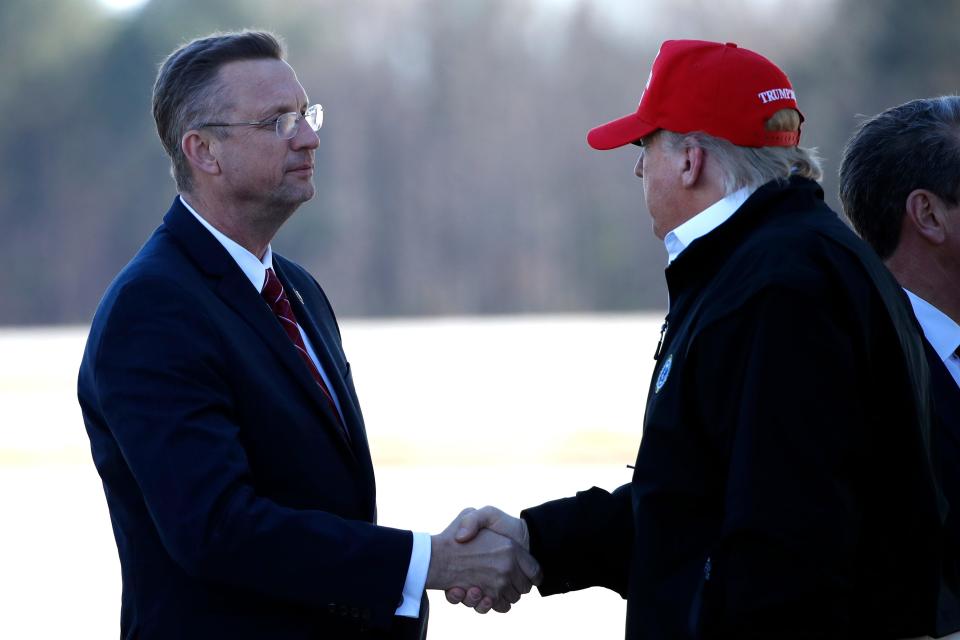
The White House has echoed the Trump campaign's sentiment. White House Press Secretary Stephanie Grisham said Monday "while we have asked all Americans to exercise common-sense hygiene measures, we are conducting business as usual."
Trump is slated to speak at the Republican Jewish Coalition meeting in Las Vegas this weekend, but First lady Melania Trump canceled a Beverly Hills fundraiser scheduled March 18. Grisham said it was due to "scheduling conflicts."
The Secret Service announced Monday it was being updated on coronavirus developments and working with medical authorities as an extension of the agency’s protective mission.
What's new:Coronavirus live updates: Another cruise ship kept from port; NY making its own sanitizer; stock market freefall
“The agency is currently working in partnership with the White House Medical Unit to ensure the safety and wellness of the president, First Family and White House staff,” Secret Service spokeswoman Cathy Milhoan said. “For operational security reasons, the U.S. Secret Service does not disclose security methods or procedures.”
The Democratic candidates are also continuing to campaign even as more coronavirus cases continue to crop up across the country.
Sen. Bernie Sanders, whose rallies routinely draw several thousands, said the issue weighs on his mind but he did not announce any plans to change the protocol for those gatherings.
“It’s something we have thought about a lot,” Sanders said during a roundtable in Detroit with medical officials discussing the effects of the coronavirus.
“We do not hold a rally without first conferring with local public health officials….I think every organization in American is taking a hard look at what the coronavirus will mean to their operations and, yes, that is true of our campaign as well.”
The senator told CNN host Chris Cuomo he's "used more hand sanitizer in the last two weeks than I’ve used in my entire life."
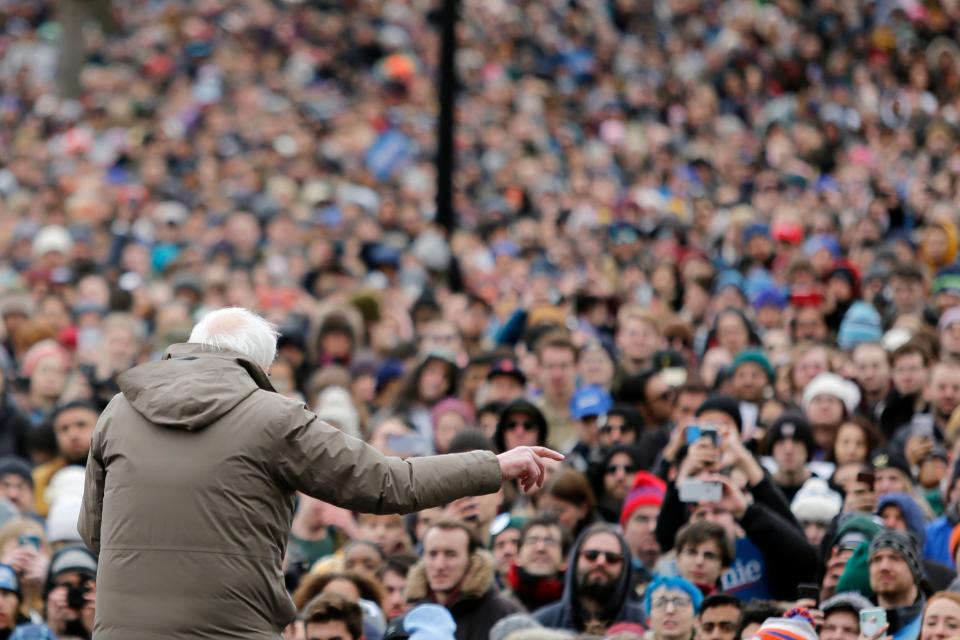
Biden's campaign also said they are following "guidance offered by federal and local public health officials on the types of events we hold and how we execute them.
Video shared online showed attendees slathering on hand sanitizer as they entered a Biden event.
People walking into the @JoeBiden rally in Detroit are being given hand sanitizer upon entry. Same was offered to the press corps. pic.twitter.com/sWLPbm8vxs
— Sarah Mucha (@sarahmucha) March 9, 2020
"In contrast with our current president, who not only doesn’t amplify the guidance that the experts offer – but directly contradicts it – Vice President Biden and our team will lead by example in following expert advice and complying with reasonable risk mitigations," the Biden campaign said in the statement.
"At the same time, we will continue to run an aggressive, national campaign to win the Democratic nomination and defeat Donald Trump."
As of Monday afternoon, Biden and Sanders had not formally requested Secret Service protection, though the agency has been preparing for months to take on expanded protection duties for multiple candidates for the 2020 campaign.
Once teams are assigned, agents typically received detailed medial briefings for them and their families to account for such things as food allergies to chronic illnesses.
The Democratic National Committee also said they will not cancel the upcoming Democratic primary debate on Sunday. The debate, which is being hosted by CNN and Univision, will be held in Arizona. Five cases of coronavirus have been reported in the state.
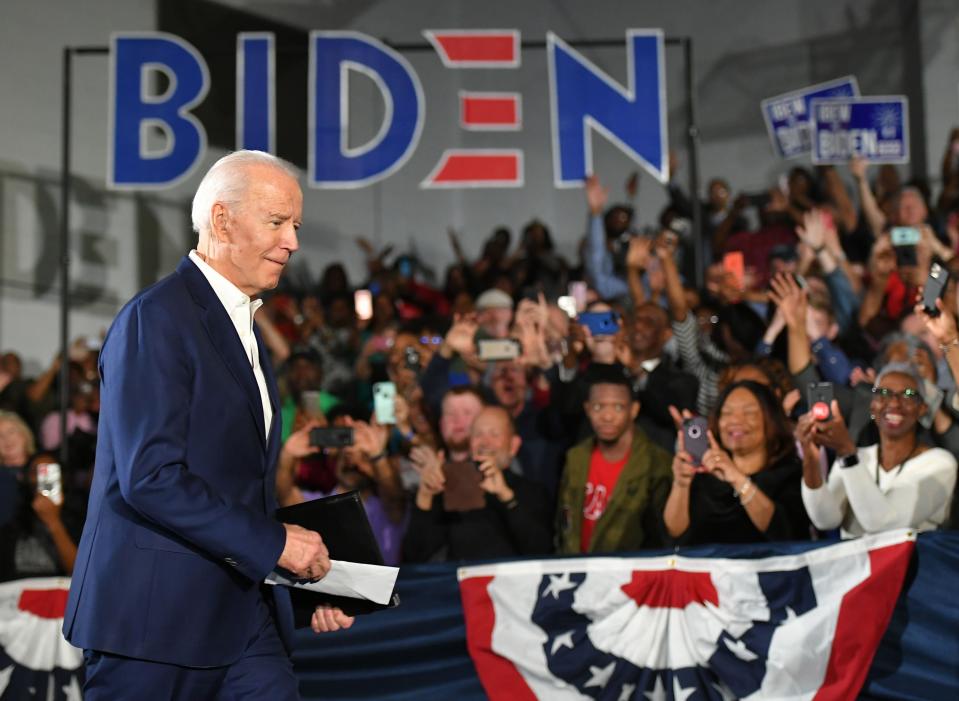
The DNC said they "are in touch with local officials and will follow their guidance."
But as presidential candidates forge ahead, Gottlieb, who served as the head of the Food and Drug Administration between May 2017 and April 2019, warned the months ahead will be difficult as health officials across the country work to mitigate the acceleration of the virus, both new and old cases that have gone undetected.
"I think that this is going to play out over the next two months, but you're really going to see a change I think in the country's perception and mood and approach over the next two weeks and things will look a lot different," he said.
Contributing: John Fritze, Ledge King, Rebecca Morin and Kevin Johnson
This article originally appeared on USA TODAY: Coronavirus outbreak: Should Trump, Biden and Sanders cancel rallies?

